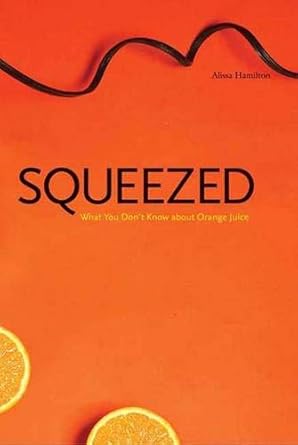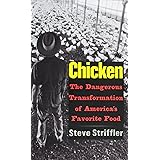




Download the free Kindle app and start reading Kindle books instantly on your smartphone, tablet, or computer - no Kindle device required.
Read instantly on your browser with Kindle for Web.
Using your mobile phone camera - scan the code below and download the Kindle app.

Follow the author
OK
Squeezed: What You Don't Know About Orange Juice (Yale Agrarian Studies Series) Hardcover – May 26, 2009
Close to three quarters of U.S. households buy orange juice. Its popularity crosses class, cultural, racial, and regional divides. Why do so many of us drink orange juice? How did it turn from a luxury into a staple in just a few years? More important, how is it that we don’t know the real reasons behind OJ’s popularity or understand the processes by which the juice is produced?
In this enlightening book, Alissa Hamilton explores the hidden history of orange juice. She looks at the early forces that propelled orange juice to prominence, including a surplus of oranges that plagued Florida during most of the twentieth century and the army’s need to provide vitamin C to troops overseas during World War II. She tells the stories of the FDA’s decision in the early 1960s to standardize orange juice, and the juice equivalent of the cola wars that followed between Coca-Cola (which owns Minute Maid) and Pepsi (which owns Tropicana). Of particular interest to OJ drinkers will be the revelation that most orange juice comes from Brazil, not Florida, and that even “not from concentrate” orange juice is heated, stripped of flavor, stored for up to a year, and then reflavored before it is packaged and sold. The book concludes with a thought-provoking discussion of why consumers have the right to know how their food is produced.
- Print length288 pages
- LanguageEnglish
- PublisherYale University Press
- Publication dateMay 26, 2009
- Dimensions6 x 1.25 x 8.75 inches
- ISBN-100300124716
- ISBN-13978-0300124712
Books with Buzz
Discover the latest buzz-worthy books, from mysteries and romance to humor and nonfiction. Explore more
Customers who viewed this item also viewed
Editorial Reviews
Review
(Kelly D. Brownell)
“You won't believe how many ambushes have been sprung on the noble orange on its tortured way from the orchard to your gullet. In this exemplary, accessible commodity study and history of regulatory failure and industrial chicanery, Hamilton lays it all out. Would that every major element in our daily diet had so able a sleuth and historian.”—James C. Scott, Yale University (James C. Scott)
"Squeezed relentlessly shatters the pleasant perceptions of morning orange juice. A strikingly original history of the Florida orange juice industry, it is deeply researched, cogently argued, and altogether eye-opening. Hamilton reveals that most of the orange juice sold in the stores is not, as advertised, either fresh or from Florida, and she advances a spirited brief for the consumer’s right to know the truth about the production of the foods they consume."—Daniel J. Kevles, Yale University
(Daniel J. Kevles)
"Full of zesty, fresh insight, concentrated scholarship, and unsweetened truths, Alissa Hamilton's Squeezed will give you a healthy mistrust not just of orange juice, but of corporate America's agenda for all our food."—Raj Patel, author of Stuffed and Starved
(Raj Patel)
". . . reveals that orange juice, with its image as a natural Florida product . . . is often shipped from South America. . . . Consumers have a right to know what they're consuming . . . and that is at the heart of [the] story."—Devra First, Boston Globe
(Devra First Boston Globe)
About the Author
Product details
- Publisher : Yale University Press; 2nd Printing edition (May 26, 2009)
- Language : English
- Hardcover : 288 pages
- ISBN-10 : 0300124716
- ISBN-13 : 978-0300124712
- Item Weight : 15.7 ounces
- Dimensions : 6 x 1.25 x 8.75 inches
- Best Sellers Rank: #1,340,332 in Books (See Top 100 in Books)
- #461 in Agriculture Industry (Books)
- #600 in Fruit Cooking
- #1,431 in Food Science (Books)
- Customer Reviews:
About the author

Discover more of the author’s books, see similar authors, read author blogs and more
Customer reviews
Customer Reviews, including Product Star Ratings help customers to learn more about the product and decide whether it is the right product for them.
To calculate the overall star rating and percentage breakdown by star, we don’t use a simple average. Instead, our system considers things like how recent a review is and if the reviewer bought the item on Amazon. It also analyzed reviews to verify trustworthiness.
Learn more how customers reviews work on Amazon-
Top reviews
Top reviews from the United States
There was a problem filtering reviews right now. Please try again later.
It makes for an interesting case study of one corner of our incredibly industrialized food system. The author seems quite fascinated by the regulatory hearings which led especially to the current state of affairs with respect to "not-for-concentrated" orange juice; the reader feels distinctly less fascinated than the author.
One thing of interest is precisely the lack of conclusions drawn. Yes, we conclude, orange juice is quite unlike the orange in the advertisements with the straw sticking straight out of it. And, yes, the way it came to be what it is today came from complex chemical, industrial, and legal processes. But there's also not any particular reason to think that these processes are dangerous or unhealthful -- just dishonest. So what, if anything, is to be done? The author deliberately refuses to answer.
Hamilton set out to chronicle the orange juice industry's influence on the biodiversity of the sweet orange. When she and Dixi, her Jack Russell terrier-Chihuahua mix, drove to Lakeland, Florida, for four months at Florida Southern College, she hit the historian's mother-lode in the Thomas B. Mack Citrus Archives, presided over by Professor Mack himself, a nonagenarian who had studied the citrus industry for more than half a century "collecting weird and wonderful memorabilia along the way."
Documents Hamilton stumbled across in her "unmethodical" search of the archives--"the only type possible in the disarray," she comments in a wry aside--changed the direction of her research and painted a damming picture of the "wholesome" citrus industry and its "tree-fresh" product. Her discoveries--and the loss of the archives after Professor Mack died--have all the ingredients of a gripping detective story. Unfortunately, this thoroughly researched book is uneven, with long stretches that read more like a dissertation than a popular book.
It's not that Hamilton isn't a good writer. But in her enthusiasm to document the metamorphosis of the Florida orange juice industry from a fresh product to a laboratory evocation, and from individual growers hand-tending orchards of decades-old trees to industrial-scale orchards of trees "depleted" and replaced like worn-out dairy cows, the story bogs down. (The acronyms don't help: I kept stumbling over FCOJ for "frozen concentrated orange juice" and NFC OJ, "not from concentrate orange juice.")
The story in Squeezed, about an industry that became so successful in deceiving the consumer that it may have killed its own market, is an important contribution to the annals of our everyday food and how it is produced and marketed.
"I wrote this book with a modest ambition," Hamilton says in the Preface, "to make you look at your glass of pre-squeezed orange juice differently and begin to see through the opaque packages of food that surround you." She achieves that ambition and more. Although not an easy read, Squeezed is worth the effort.
by Susan J. Tweit
for Story Circle Book Reviews
reviewing books by, for, and about women





